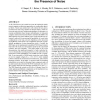Free Online Productivity Tools
i2Speak
i2Symbol
i2OCR
iTex2Img
iWeb2Print
iWeb2Shot
i2Type
iPdf2Split
iPdf2Merge
i2Bopomofo
i2Arabic
i2Style
i2Image
i2PDF
iLatex2Rtf
Sci2ools
116
Voted
DAC
2005
ACM
2005
ACM
Designing logic circuits for probabilistic computation in the presence of noise
As Si CMOS devices are scaled down into the nanoscale regime, current computer architecture approaches are reaching their practical limits. Future nano-architectures will confront devices and interconnections with a large number of inherent defects, which motivates the search for new architectural paradigms. In this paper, we examine probabilistic-based design methodologies for nanoscale computer architectures based on Markov random fields (MRF). The MRF approach can express arbitrary logic circuits and the logic operation is achieved by maximizing the probability of correct state configurations in the logic network depending on the interaction of neighboring circuit nodes. The computation proceeds via probabilistic propagation of states through the circuit. Crucially, the MRF logic can be implemented in modified CMOS-based circuitry that trades off circuit area and operation speed for the crucial fault tolerance and noise immunity. This paper builds on the recent demonstration that s...
Related Content
| Added | 13 Nov 2009 |
| Updated | 13 Nov 2009 |
| Type | Conference |
| Year | 2005 |
| Where | DAC |
| Authors | Kundan Nepal, R. Iris Bahar, Joseph L. Mundy, William R. Patterson, Alexander Zaslavsky |
Comments (0)

